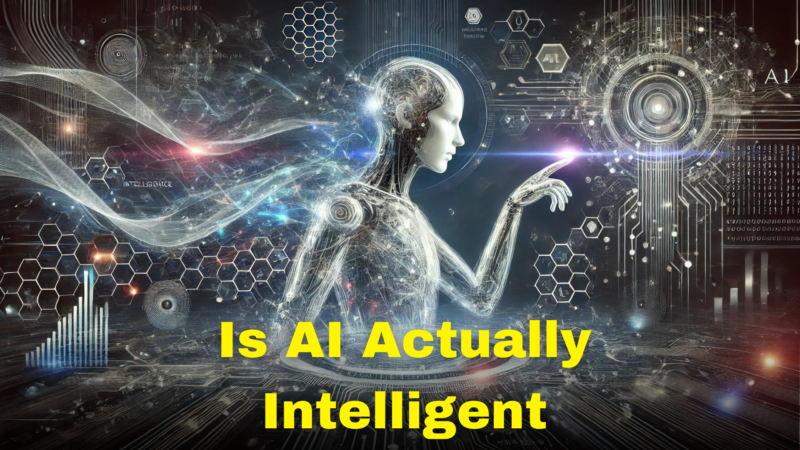Is AI Actually Intelligent

Is AI Actually Intelligent
Artificial Intelligence is often described as “intelligent”; the truth about its capability to equal the human mind is a contested issue. AI systems such as machine learning algorithms and neural networks were able to emulate some specific cognitive functions of humans, like: learning, reasoning about things, and problem solving. Yet these systems take on none of the traits of consciousness, self-awareness, or general intelligence-the ability to understand and make sense of any situation, which is one hallmark of human intelligence.
The Understanding of Intelligence of AI
AI systems like narrow AI are brilliant in special works like those of human beings that include language translation, facial recognition, or making a chess game. Such AI systems usually go through large datasets and then attempt to model features and imply a prediction. The present capabilities of a machine are as good as its capabilities: It lacks flexibility, creativity, understanding active time, and learning since it may or may not “understand” its assigned task in human speak.
Thus, such systems generate text or solve problems, such as those based on OpenAI’s GPT, by generalizing from a set of norms: they have no consciousness, emotions, or subjective experiences as guides to human thought. The intelligence that they possess is limited to the programming they were made with and the data they have learned from; hence they are exceptionally skillful in specific domains but are not very flexible at getting out of those bounds.
Narrow AI vs. Artificial General Intelligence (AGI)
AI being currently known as, narrow AI, refers to its design of operation of limited tasks. For example, virtual assistants such as Siri or Alexa, or recommendation algorithms on streaming platforms. These systems are set up to work only within that limited configuration for which they are programmed.
Artificial General Intelligence (AGI) designates an AI that would be capable of performing any mental tasks humans can perform. AGI would reason, understand abstract concepts, and be capable of learning any new skill without requiring retraining. Many AI researchers see AGI as their goal, but that type of intelligence is still a long way off.
Limitations of AI
- Understanding Capacity: AI systems process data, with no ability to comprehend meaning or context of the presented information. They respond with answers generated on the basis of learned syntactic and semantic probabilities but remain oblivious to the logical concepts these answers may discuss.
- Creativity lessness: AI is not actually creative. It can generate art, music, or writing based on patterns in the data, but it cannot have an original vision or idea in the way humans can.
- Inability to Function without Proper Data: AI systems can only work and learn with sufficient data and large datasets. Without the expected database of knowledge, no other means of thinking or working, it can barely function. In contrast, human intelligence can arrive at a conclusion with little data.
- Ethics in the Decision-Making: Human intelligence operates via different constructs such as ethics, emotions, or mere morality. If AI lacks the moral compass, it bases its decisions on logic and programming rules: this can pose great potential for ethical dilemmas.
Conclusion: AI is Not Really Intelligent
However, with the capacity to solve most complex problems and emulate human cognition, AI is really not a smart machine. It does not possess self-awareness, flexibility, or the broad scope of general intelligence that humans have. For now, it remains a very powerful tool that only enhances human capabilities while never attempting to mimic the full gamut of human intelligence.
Time will pass, and so will AI change, but it is still not clear if it ever will have a chance to become truly intelligent. For now, AI does very few things, but it does them very well, that is why it calls it “smart.”.
Important Link
- How did Kris Kristofferson die
- How to sign in bank of America online
- Millie Bobby Brown and Jake Bongiovi: A Love Story for the Ages
- India Women vs South Africa Women Cricket Match 2024
- Is Iran attacking Israel
- What happened to John Amos
- How many leagues are there in sports
- What are sports leagues
- How many times India beat Bangladesh?
Disclaimer: chronobazaar.com is created only for the purpose of education and knowledge. For any queries, disclaimer is requested to kindly contact us. We assure you we will do our best. We do not support piracy. If in any way it violates the law or there is any problem, please mail us on chronobazaar2.0@gmail.com
